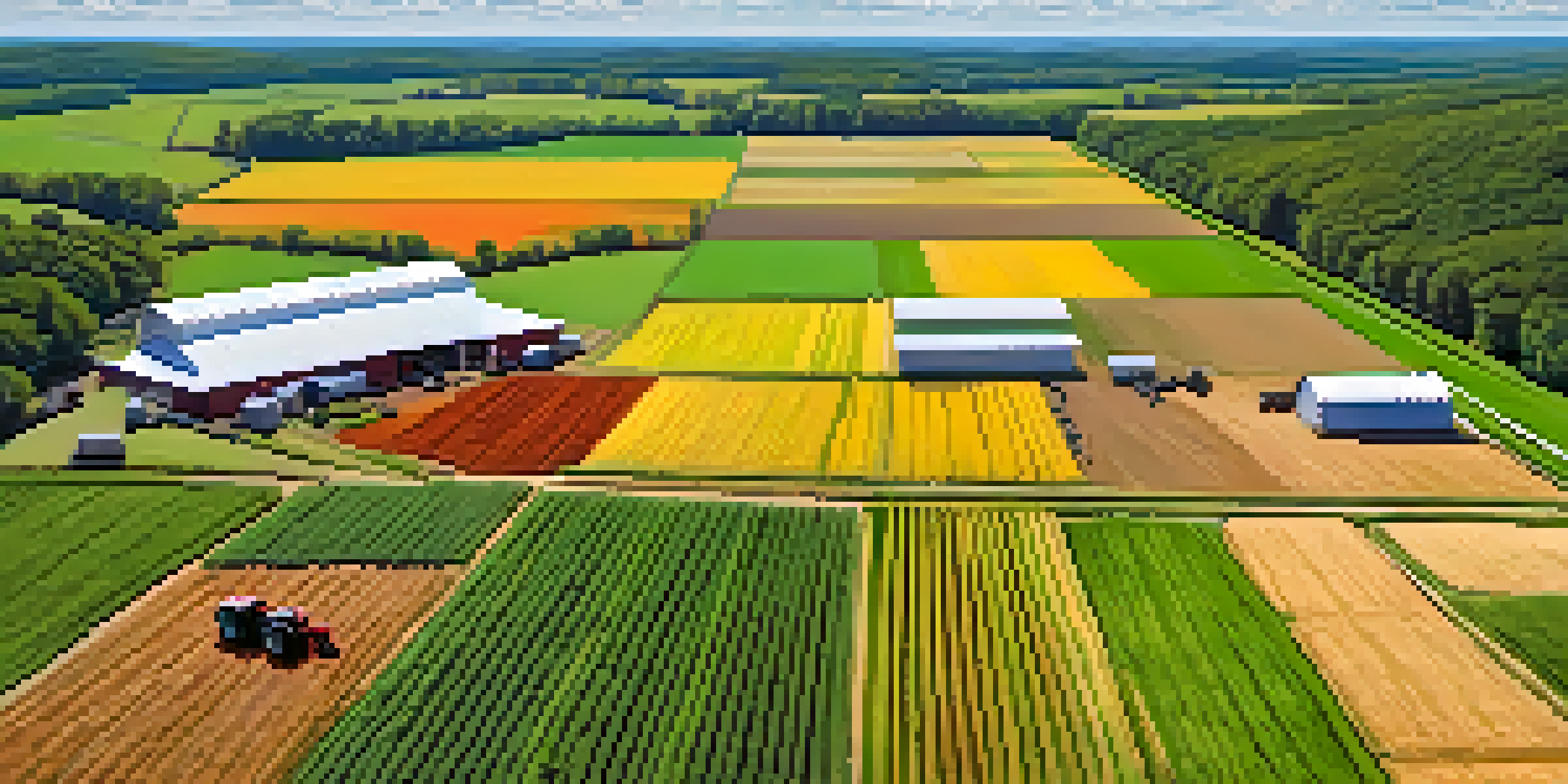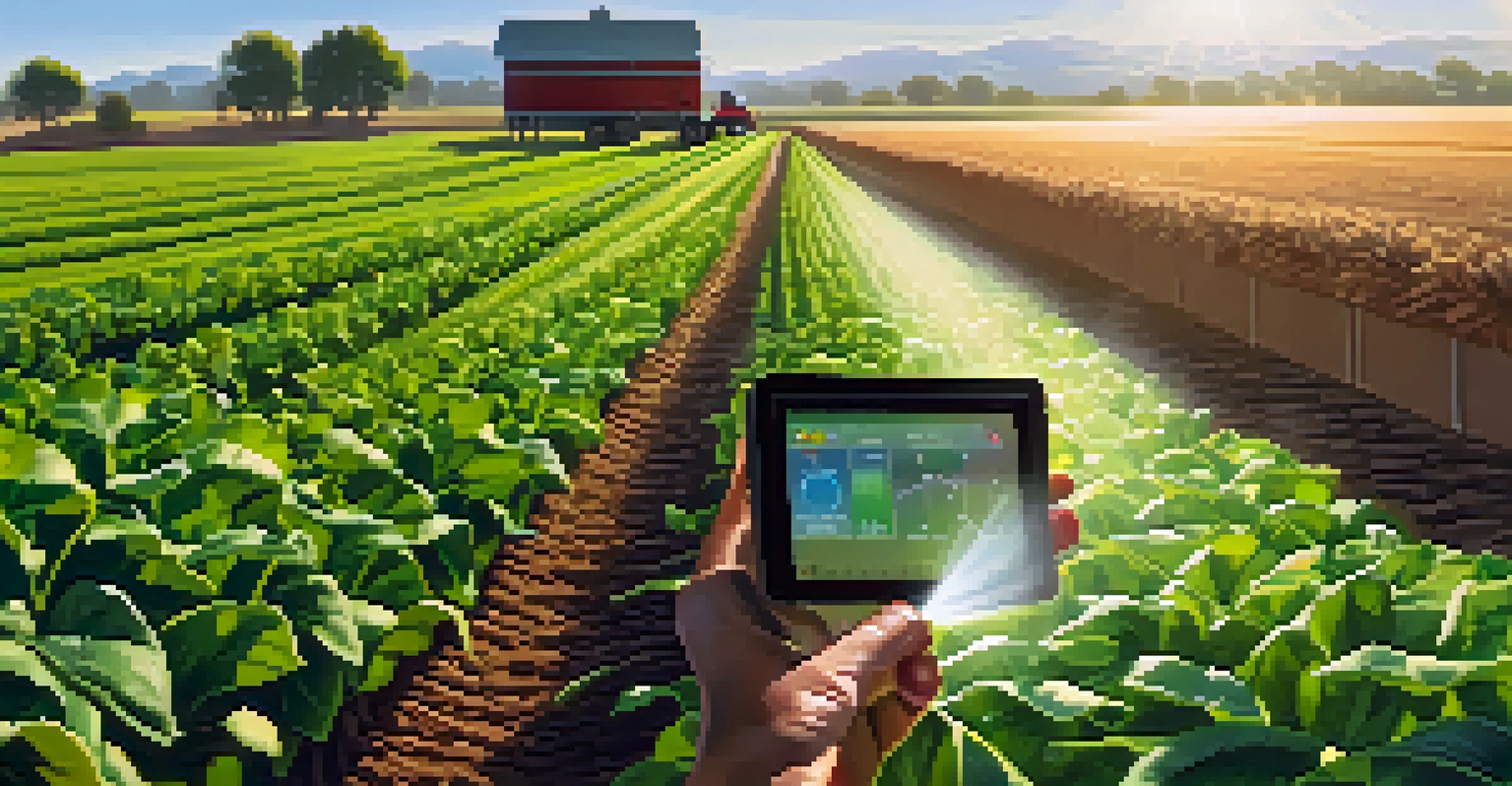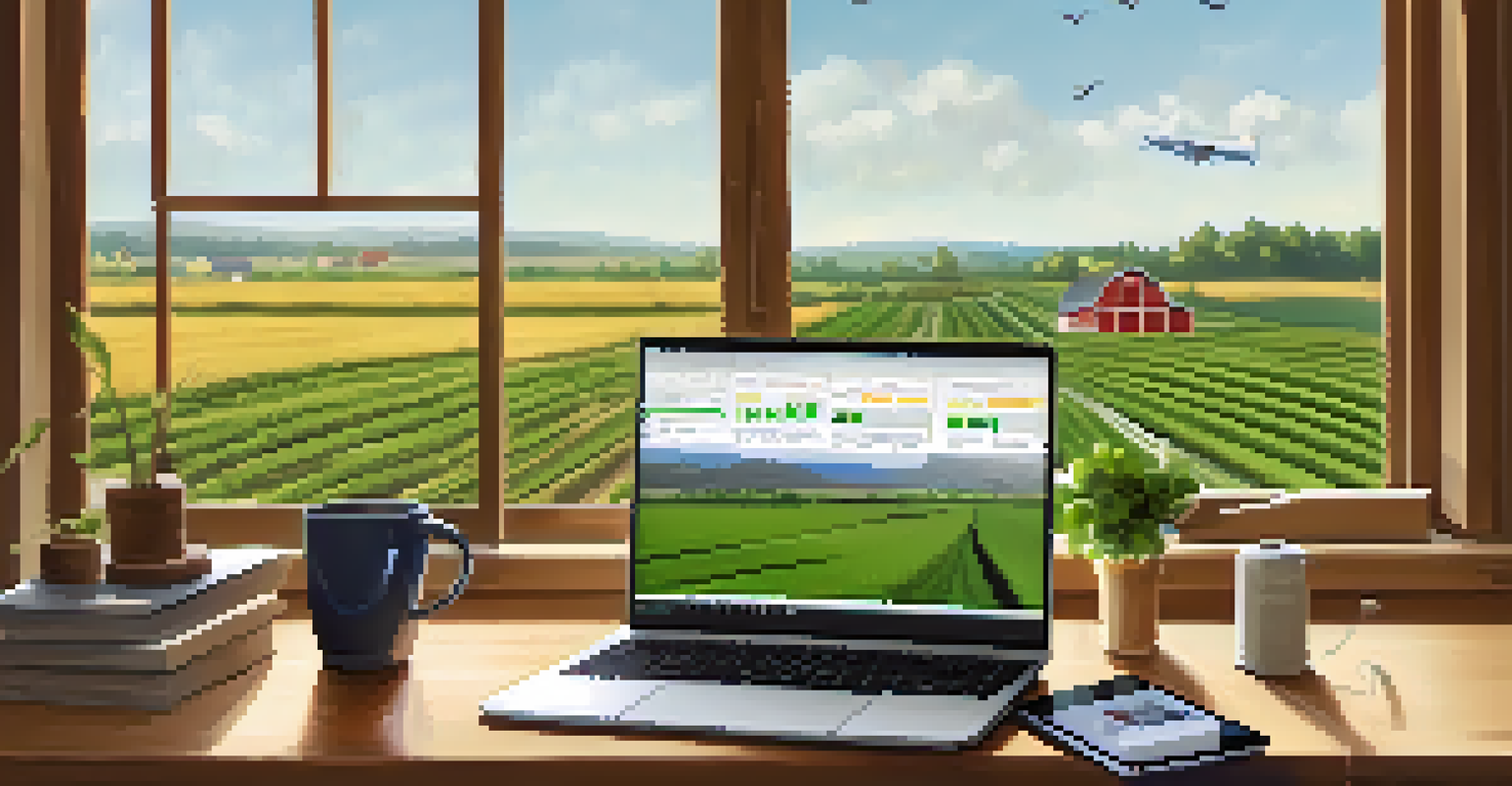How Technology is Enhancing Georgia's Agricultural Sector

The Rise of Precision Agriculture in Georgia
Precision agriculture is making waves across Georgia's farms, allowing producers to optimize their yields and resources effectively. By utilizing GPS technology and soil sensors, farmers can gather detailed data about their fields, ensuring they apply the right amount of water, fertilizers, and pesticides. This targeted approach not only boosts crop production but also promotes sustainable farming practices, reducing waste and environmental impact.
Precision agriculture is the future of farming, leveraging technology to enhance productivity while promoting sustainability.
For instance, a farmer in South Georgia might use drones to monitor crop health from above, identifying areas that need attention. This real-time data can prevent potential issues before they escalate, saving both time and money. As a result, farmers are not only increasing their productivity but also enhancing the quality of their produce, making Georgia's agricultural products even more competitive in the market.
Moreover, precision agriculture allows for better financial planning. By understanding exactly how much input is required for each section of their farm, growers can strategically allocate their budgets. This level of insight into farm management is transforming the agricultural landscape in Georgia, paving the way for a more data-driven and efficient future.
Smart Irrigation Systems Boosting Efficiency
Water conservation is a critical issue in agriculture, especially in a state like Georgia, where droughts can be a concern. Enter smart irrigation systems, which utilize technology to ensure crops receive just the right amount of water when they need it. These systems are equipped with sensors that monitor soil moisture levels and weather conditions, adjusting irrigation schedules accordingly.

For example, a farmer might install a smart irrigation system that automatically waters their fields based on real-time data. This not only conserves water but also helps prevent over-saturation, which can harm crops. By using this technology, farmers are seeing a notable decrease in water usage while simultaneously improving crop health and yield.
Precision Agriculture Enhances Yields
Farmers in Georgia are leveraging precision agriculture technologies to optimize crop production and promote sustainable practices.
As the demand for sustainable practices grows, adopting smart irrigation systems is becoming increasingly essential for farmers. It’s not just about saving water; it’s about creating a resilient agricultural system in Georgia that can adapt to changing environmental conditions. This shift towards smarter water management reflects a broader commitment to sustainability within the state's agricultural sector.
The Impact of Drones in Agriculture
Drones are changing the face of agriculture in Georgia, offering innovative ways to monitor crops and assess field conditions. These flying devices can capture high-resolution images and collect data that help farmers identify issues such as pest infestations or nutrient deficiencies before they become widespread. The speed and efficiency of drone technology are revolutionizing traditional farming methods.
Drones have the potential to revolutionize agriculture, providing insights that were previously impossible to obtain.
Imagine a farmer flying a drone over their fields, receiving instant feedback on crop health. This capability allows for quick decision-making and targeted interventions, which can lead to significant cost savings. Drones can also be used for seed planting and crop spraying, making these processes more efficient and less labor-intensive.
Beyond immediate benefits, the use of drones contributes to long-term sustainability goals. By reducing the need for chemical applications through precise targeting, farmers can minimize their environmental footprint while still maximizing productivity. This integration of drone technology exemplifies how modern innovations are enhancing agricultural practices in Georgia.
Blockchain Technology for Supply Chain Transparency
Blockchain technology is making its way into Georgia's agricultural sector, providing farmers and consumers with a transparent supply chain. By utilizing blockchain, every transaction and movement of agricultural products can be recorded securely and immutably. This ensures that consumers have access to information about where their food comes from, promoting trust and accountability in the food system.
For instance, a farmer could use blockchain to trace their produce from the field to the grocery store. This level of transparency can help address concerns about food safety and quality. If a problem arises, it’s easier to pinpoint the source and take action, thereby protecting both consumers and producers.
Smart Irrigation Systems Save Water
The adoption of smart irrigation systems enables Georgia farmers to conserve water while improving crop health and yield.
As consumers increasingly demand transparency about their food sources, blockchain technology offers a way for farmers to meet these expectations. This not only enhances the reputation of Georgia's agricultural products but also strengthens the market position of local farmers. Embracing such innovations is essential for fostering a resilient and trustworthy food supply chain.
Mobile Apps Transforming Farm Management
Mobile technology is also playing a crucial role in transforming farm management in Georgia. With the proliferation of smartphones, farmers now have access to a variety of mobile apps designed to streamline operations, track expenses, and monitor crop health. These tools empower farmers to make informed decisions right from the field, enhancing their productivity.
For example, a farmer might use an app to log field activities, such as planting dates and pesticide applications. This not only helps in maintaining accurate records but also assists in planning for future seasons. By integrating technology into their daily routines, farmers can manage their time and resources more efficiently.
Additionally, many apps offer weather forecasting and market price updates, helping farmers navigate the complexities of agricultural economics. This instant access to information enables farmers to adapt quickly to changing conditions, minimizing risks and maximizing profits. Mobile apps are thus becoming indispensable tools for Georgia's modern farmers.
Artificial Intelligence in Crop Management
Artificial intelligence (AI) is making strides in Georgia's agricultural sector, providing farmers with advanced tools for crop management. By analyzing vast amounts of data, AI can help predict crop yields, optimize planting schedules, and even identify potential pest threats. This technology allows farmers to make data-driven decisions that enhance productivity and sustainability.
Consider a scenario where AI algorithms analyze historical weather patterns and soil conditions to recommend the best times for planting. This kind of predictive analysis can significantly improve a farmer's chances of a successful harvest. By harnessing AI, farmers are no longer relying solely on traditional methods; they are integrating cutting-edge technology into their practices.
Drones Revolutionize Crop Monitoring
Drones provide Georgia farmers with innovative tools for monitoring crop health, leading to quicker decision-making and enhanced sustainability.
Moreover, AI can be used for precision spraying, ensuring that pesticides and fertilizers are applied only where needed. This reduces chemical usage and minimizes environmental impact, aligning with the growing demand for sustainable agriculture. As AI continues to evolve, its role in Georgia's farming landscape will likely become even more significant.
The Future of Agriculture: Integration and Innovation
Looking ahead, the future of Georgia's agricultural sector lies in the integration of various technologies and continuous innovation. As farmers adopt tools like precision agriculture, smart irrigation, drones, blockchain, and AI, we can expect a more interconnected and efficient farming ecosystem. This shift not only benefits farmers but also enhances food security and sustainability efforts.
Collaboration among tech providers, researchers, and farmers will be vital in driving this transformation. By working together, stakeholders can develop solutions tailored to the unique challenges faced by Georgia’s agricultural sector. For instance, partnerships can lead to the creation of customized software that meets the specific needs of local farmers.

Ultimately, embracing technology is not just about improving yields; it's about creating a resilient agricultural system that can withstand environmental changes and market fluctuations. As Georgia continues to innovate, it sets a precedent for other agricultural regions, showcasing how technology can lead to a thriving, sustainable future in farming.